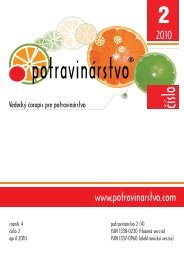Create successful ePaper yourself
Turn your PDF publications into a flip-book with our unique Google optimized e-Paper software.
Effect of heating parameters on oxidative stability of oils<br />
Oxidative stability is an important parameter in evaluating<br />
the quality of oils and fats and is greatly affected by their<br />
fatty acid composition and minor components such as<br />
tocopherol and tocotrienols. Induction period (IP, h) for<br />
fresh as well as heated oils was in order: flaxseed oil <<br />
walnut oil< linola oil. It is correlated with polyunsaturated<br />
fatty acids content (especially with linolenic acid). The large<br />
degree of linolenic acid in flaxseed oil reduced its stability.<br />
Obtained results are with agreement with other authors, who<br />
compared oxidative stability of different cold-pressed oils.<br />
Bozan at al. (2008) stated that flaxseed oil exhibited the<br />
lower oxidative stability in comparison with safflower and<br />
poppy oils. Savage at al (1999) showed that walnut oils<br />
were more unstable in the Rancimat test when compared to<br />
hazelnut oil and that their oxidative stability depended<br />
significantly on walnut variety. Such results suggest that<br />
minor components play very important role and their natural<br />
composition could significantly influence this quality<br />
parameter. Because of that its quite popular to stabilize oils<br />
with addition of natural or synthetic antioxidants (Rudnik at<br />
al. 2001; Tabee at al. 2008).<br />
Thermal degradation of fatty acids as well as other<br />
compounds significantly decrease oxidative stability of oils<br />
– especially rich in polyunsaturated fatty acids. This<br />
changes could be correlated with colour changes, but it<br />
should be followed by additional tests.<br />
CONCLUSION<br />
It has been stated that heating effected colour of all<br />
examined oils. The changes, observed as colour darkening,<br />
increased with heating time and temperature. During heating<br />
of oils decreased L and b values and increased a value. The<br />
biggest colour changes were observed for walnut oil while<br />
the most stable colour had low-linolenic flaxseed oil. At the<br />
same conditions (180ºC/120min) ∆E of walnut oil was 3<br />
times higher than of linola oil.<br />
Oxidative stability of oils decreased with increasing heating<br />
temperature and time. At highest heating temperature the<br />
oxidative stability of high-linolenic flaxseed and walnut oils<br />
decreased 2 times faster than low-linolenic flaxseed oil. The<br />
best properties, regardless of heating temperature and time,<br />
exhibited low-linolenic flaxseed oil (linola).<br />
REFERENCE<br />
BOZZAN BERRIN, TEMELLI FERAL. 2008. Chemical<br />
composition and oxidative stability of flax, safflower and poppy<br />
seed and seed oils. In Bioresource Technology, 2008, 99, s.<br />
6354-6359.<br />
CHOO W. S., BIRCH E. J., DUFOUR J. P. 2007.<br />
Physicochemical and stability characteristics of flaxseed oils<br />
during pan-heating. In Journal of American Oil Chemist’s<br />
Society, 2007, 84, s. 735-740 .<br />
CHOO, WEE-SIM., BIRCH, JOHN, DUFOUR, JEAN-<br />
PIERRE. 2007. Physicochemical and quality characteristics of<br />
<strong>Potravinárstvo</strong><br />
cold-pressed flaxseed oils. In Journal of Food Composition and<br />
Analysis, 2007, 20, s. 202-211.<br />
HOSSEINIAN F. S., ROWLAND G. G., BHIRUD P. R.,<br />
DYCK J. H., TYLER R. T. 2004. Chemical composition and<br />
physicochemical and hydrogenation characteristics of highpalmitic<br />
acid solin (low-linolenic acid flaxseed oil). In Journal<br />
of American Oil Chemist’s Society, 2004, 81, s. 185-188.<br />
MASKAN MEDENI. 2003. Change in colour and<br />
rheorogical behaviour of sunflower seed oil during frying and<br />
after adsorbent treatment of used oil. In European Food<br />
Research Technology, 2003, 218, s. 20-25.<br />
OOMAH B. DAVE, SITTER LAURIE. 2009. Characteristics<br />
of flaxseed hull oil. In Food Chemistry, 2009, 114, s. 623-628.<br />
RUDNIK E., SZCZUCINSKA A., GWARDNIAK H.,<br />
SZULC A., WINIARSKA A. 2001. Comparative studies of<br />
oxidative stability of linseed oil. In Thermochimica Acta, 2001,<br />
370, s. 135-140.<br />
SABUDAK TEMINE. 2007. Fatty acid composition of seed<br />
and leaf oils of pumpkin, walnut, almond, maize, sunflower and<br />
melon. In Chemistry of Natural Compounds, 2007, 43, s. 465-<br />
467.<br />
SAVAGE G. P., DUTTA P. C., McNEIL D. L. 1999. fatty<br />
acid and tocopherol contents and oxidative stability of walnut<br />
oils. In Journal of American Oil Chemist’s Society, 1999, 76, s.<br />
1059-1063.<br />
SIKORSKA, EWA, CAPONIO, FRANCESCO, BILANCIA,<br />
MARIA T., SUMMO, CARMINE, PASQUALONE<br />
ANTONELLA, KMELINSKII, IGOR V., SIKORSKI,<br />
MAREK. 2007. Changes in colour of extra-virgin olive oil<br />
during storage. In Polish Journal of Food and Nutrition<br />
Sciences, 2007, 57, s. 495-498.<br />
TABEE ELHAM, AZADMARD-DAMIRCHI SODEIF,<br />
JÄGERSTAD MARGERITA, DUTTA PARESH. 2008.<br />
Effects of α-tocopherol on oxidative stability and phytosterol<br />
oxidation during heating in some regular and high-oleic<br />
vegetable oils. In Journal of American Oil Chemist’s Society,<br />
2008, 85, s. 857-867.<br />
TZANG BOR-SHOW, YANG SHUN-FA., FU SHIH-GUEI.,<br />
YANG HUI-CHUN. , SUN HAI-LUN., CHEN YI-<br />
CHEN.2009. Effects of dietary flaxseed oil on cholesterol<br />
metabolism of hamsters. In Food Chemistry, 2009, 114, s.<br />
1450-1455.<br />
WIESENBORN D., KANGAS N., TOSTENSON K., HALL<br />
C., Chang K.2005. Sensory and oxidative quality of screwpressed<br />
flaxseed oil. In Journal of American Oil Chemist’s<br />
Society, 2005, 82, 887-892.<br />
WRONIAK, MAŁGORZATA , KRYGIER KRZYSZTOF.<br />
<strong>2006</strong>. Oleje tłoczone na zimno. In Przemysł Spożywczy, <strong>2006</strong>,<br />
7, s. 30-32.<br />
Contact address:<br />
Agnieszka Kita (PhD, DSc), Department of Food Storage and<br />
Technology, Wrocław University of Environmental and Life<br />
Sciences, ul. Norwida 25, 50-375 Wrocław, Poland, tel.: +48<br />
71 3205038, e-mail: Agnieszka.Kita@wnoz.up.wroc.pl fax:<br />
+48 71 3205221,<br />
Ewa Płuciennik (MSc), Department of Food Storage and<br />
Technology, Wrocław University of Environmental and Life<br />
Sciences, ul. Norwida 25, 50-375 Wrocław, Poland<br />
ročník 4 34 1/2010






